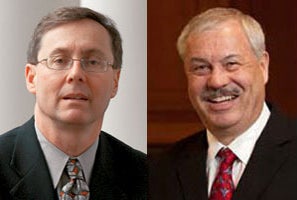In an online forum, Harvard Law School Professor Lucian Bebchuk engaged in a debate with Ohio State University Professor Rene Stulz regarding the role executive compensations played in the financial crisis.
The debate focused on the question: Has executive compensation contributed to the financial crisis?, and was hosted by the World Bank’s “All About Finance” Blog editor, Asli Demirgüç-Kunt, director of development policy in the World Bank’s Development Economics Vice Presidency.
In her introduction, Demirgüç-Kunt said: “The list of potential culprits is long and ranges from bank deregulation to the ‘alchemy’ of credit ratings and structured finance. This debate focuses on one factor that has allegedly contributed to the crisis: greedy bankers and the executive compensation packages that tempted them to, quite literally, bet the bank.”
Bebchuk, who focuses his research on corporate governance, law and finance, and law and economics, argued that executive compensation contributed to the financial crisis by encouraging excessive risk-taking. He wrote: “Giving these concerns the weight they deserve is important not only for understanding the recent past – which it is – but also for according adequate priority to the task of fixing pay arrangements.”
You can read Bebchuk’s opening statement here and his rebuttal here.
During the debate, Bebchuk, director of Harvard Law School’s Program on Corporate Governance, referenced several studies by the Corporate Governance Program, including “Regulating Bankers’ Pay,” and “Paying for Long-Term Performance.”
Stulz argued that despite conventional wisdom dictating that reforming banker compensation is the best way to prevent another crisis, the facts simply do not support it. “On the contrary, CEOs had strong incentives to maximize shareholder wealth because they owned so much stock in their firms,” wrote Stulz. “If one were to conclude that shareholders had incentives to take more risk than was socially optimal for economic stability, then the problem was not compensation but the incentives of shareholders.”
You can read Professor Stulz’s opening statement here and his rebuttal here.
Stulz is the Everett D. Reese Chair of Banking and Monetary Economics and the Director of the Dice Center for Research in Financial Economics at The Ohio State University. He was the editor of the Journal of Finance for twelve years and he has published more than sixty papers in finance and economics journals.
